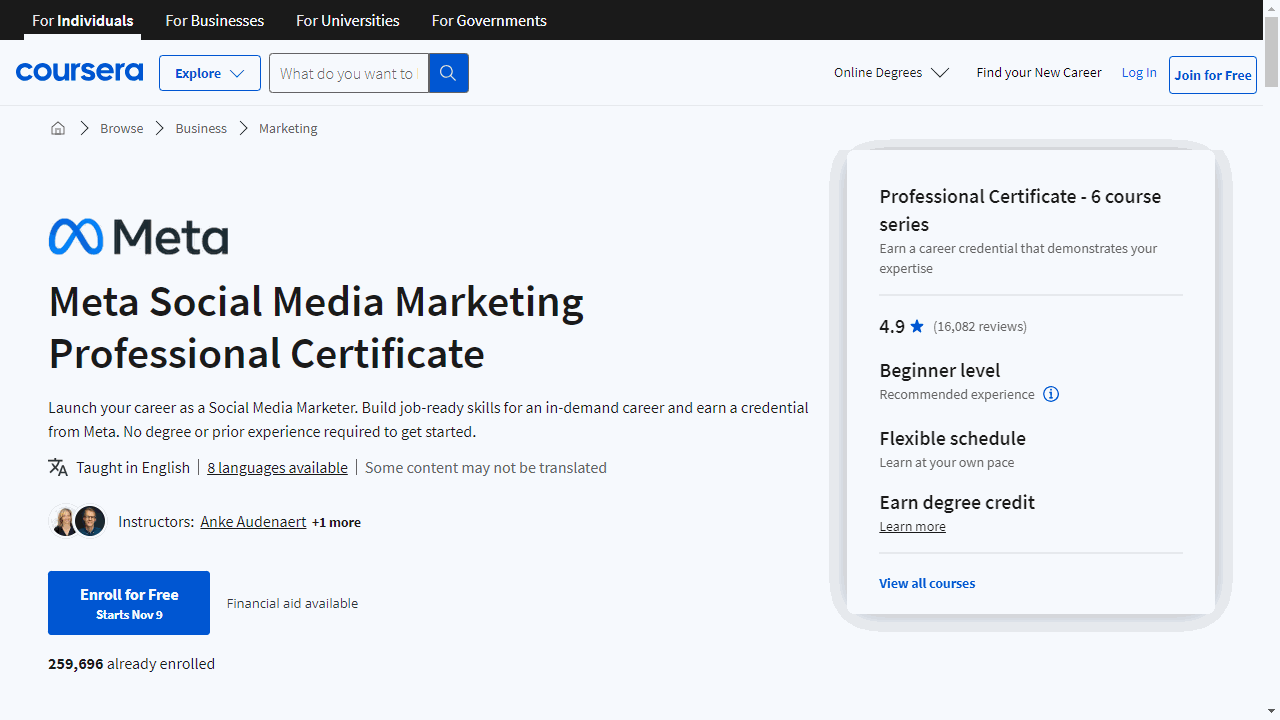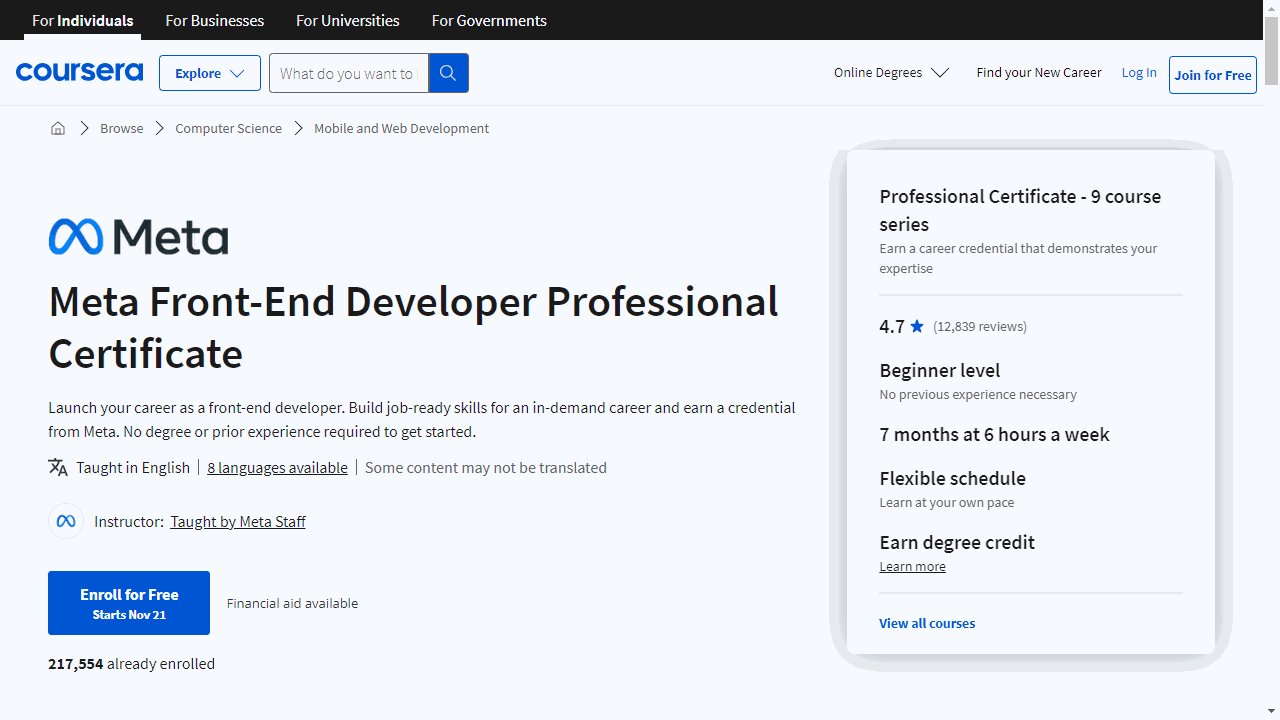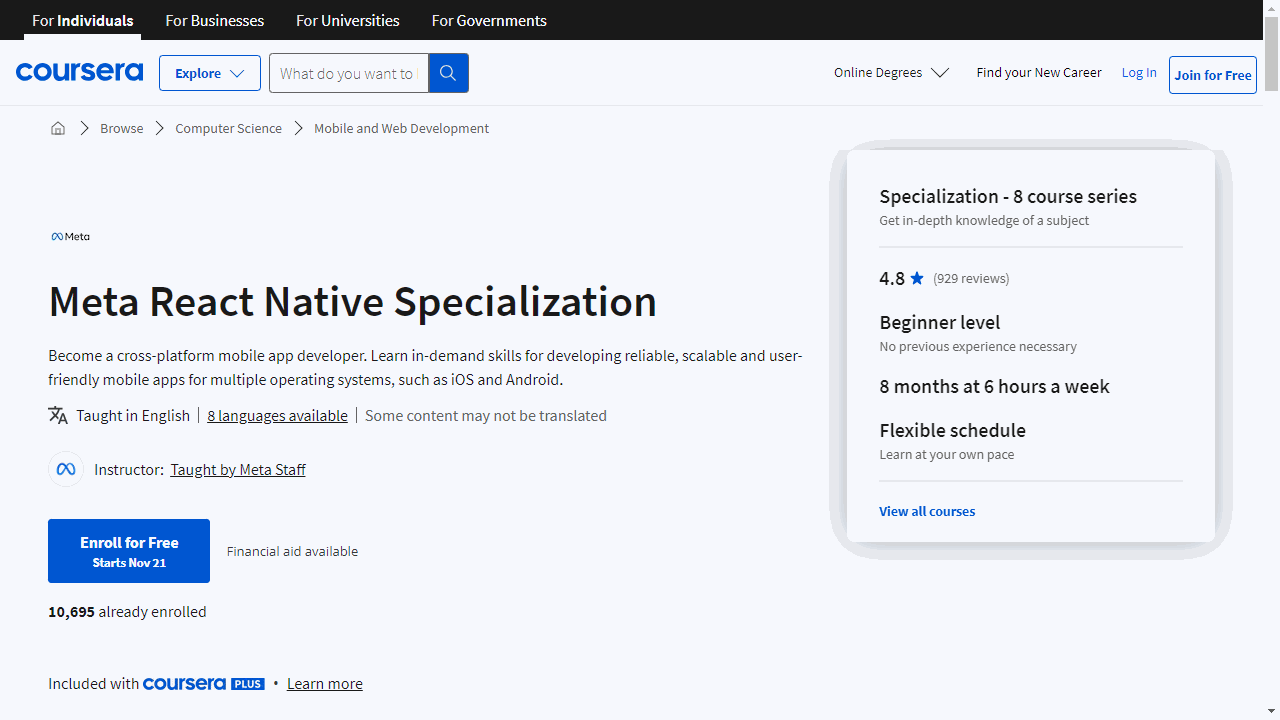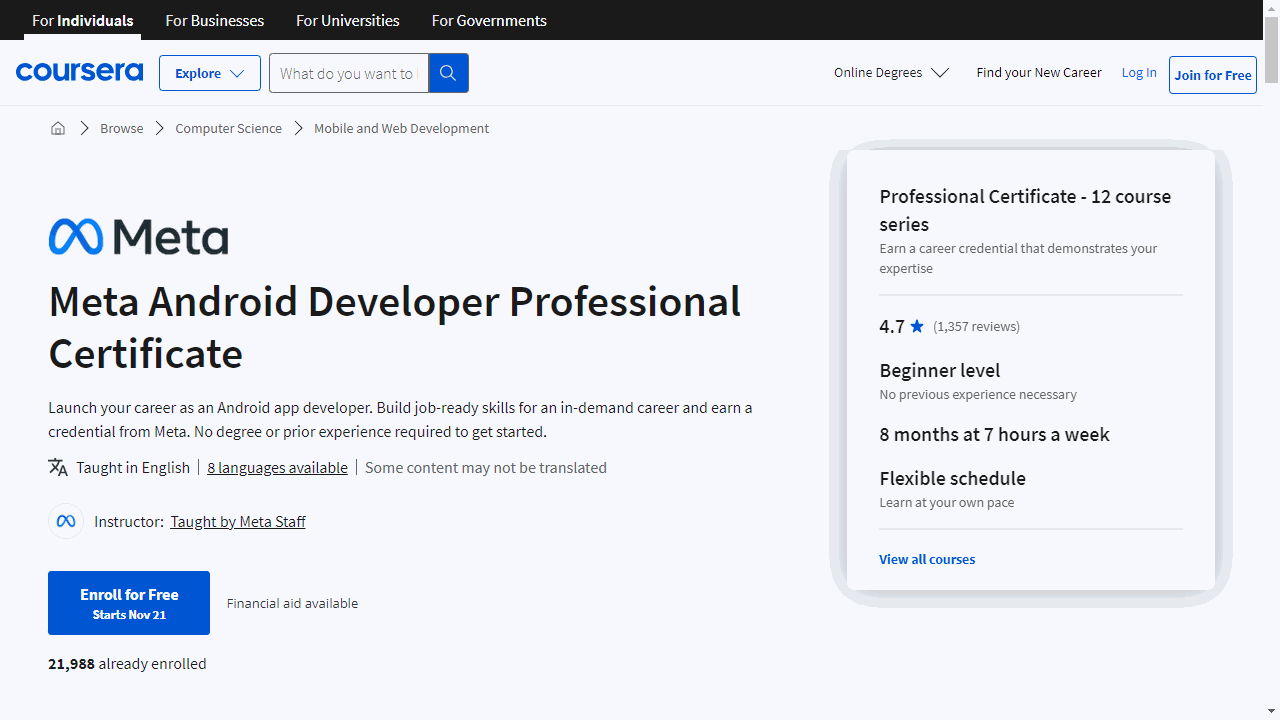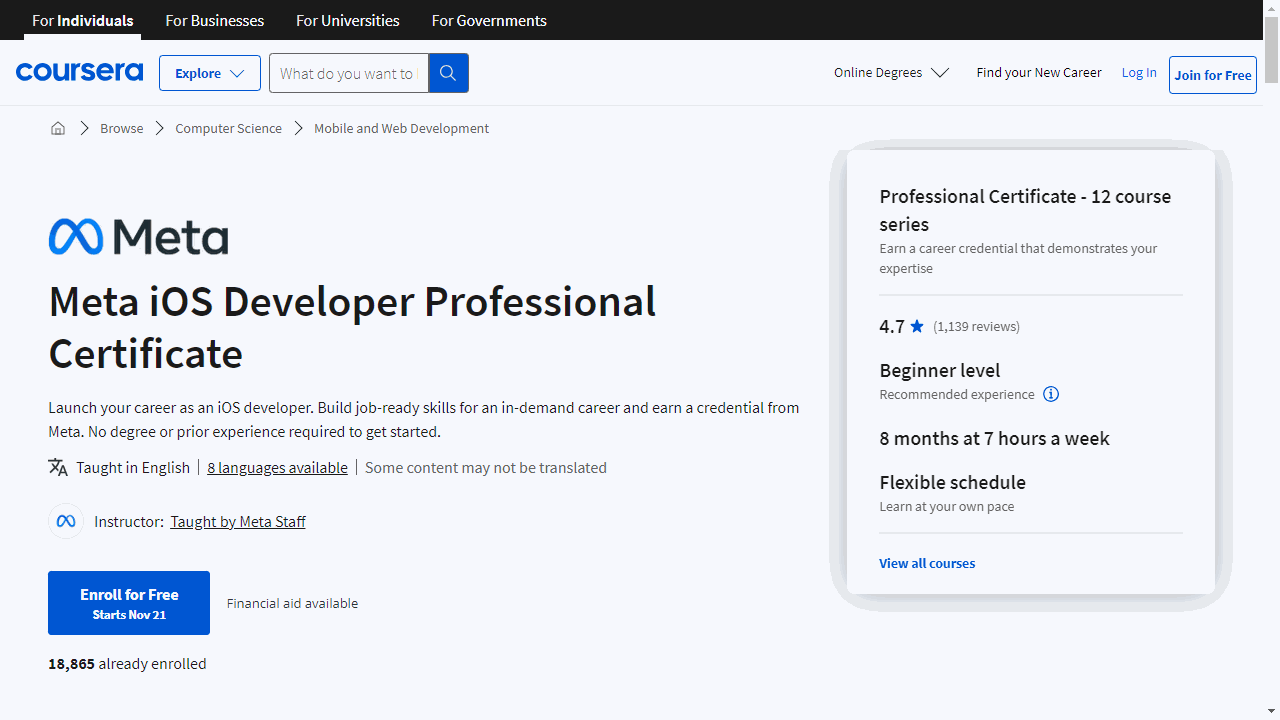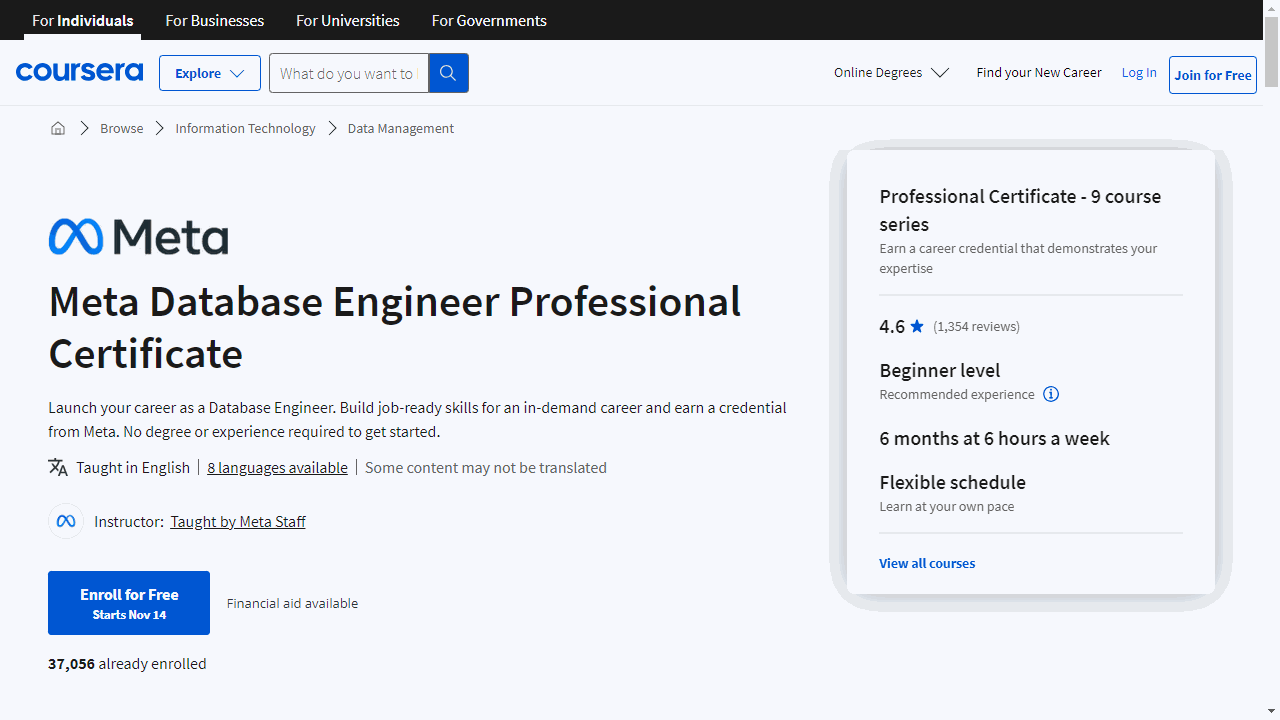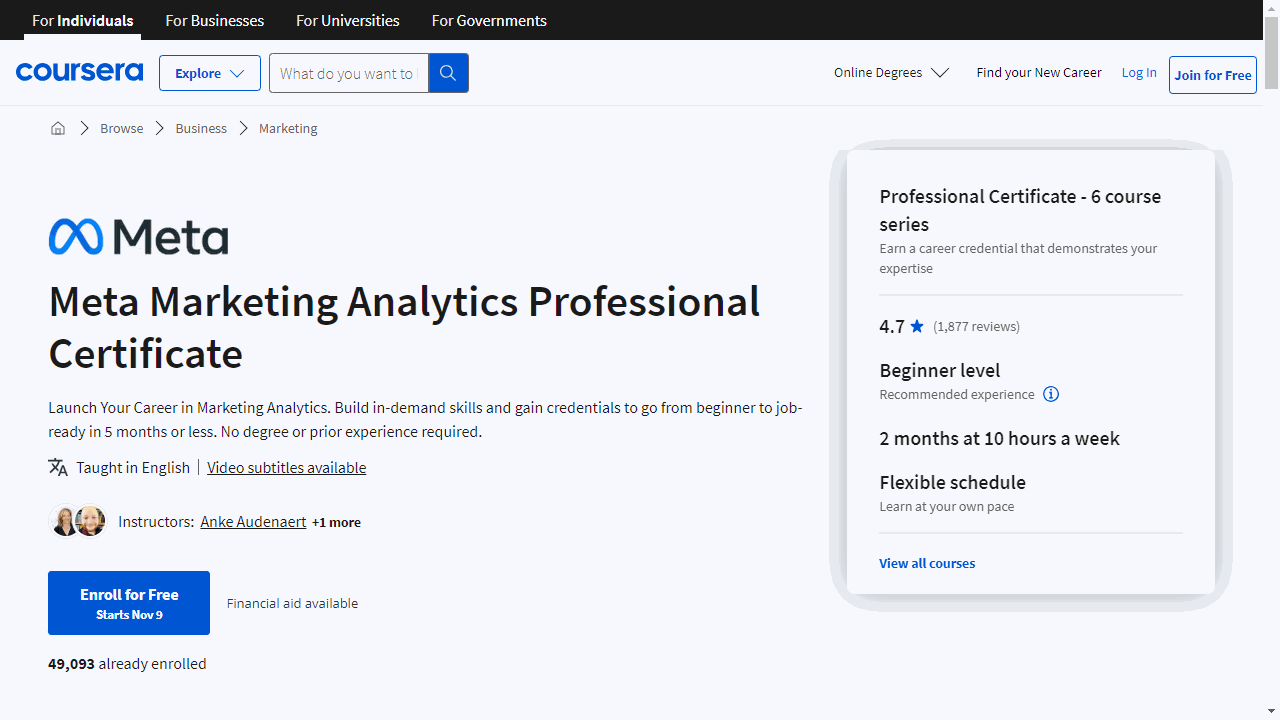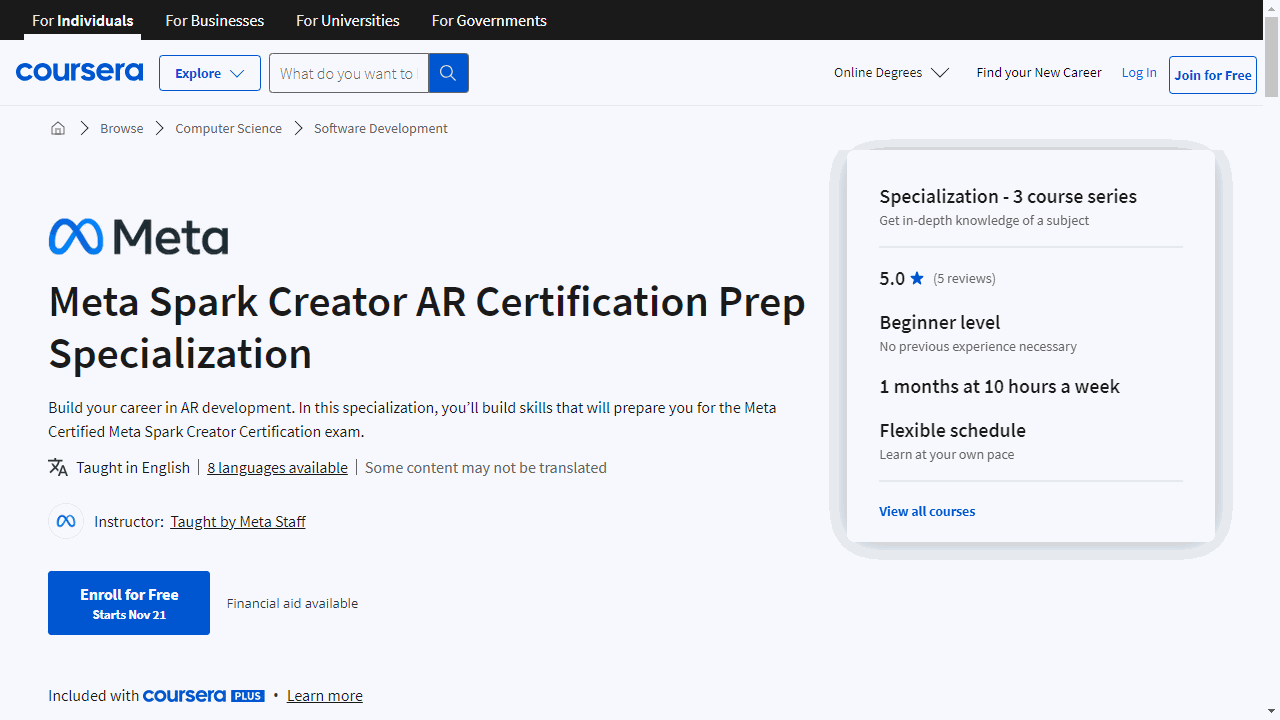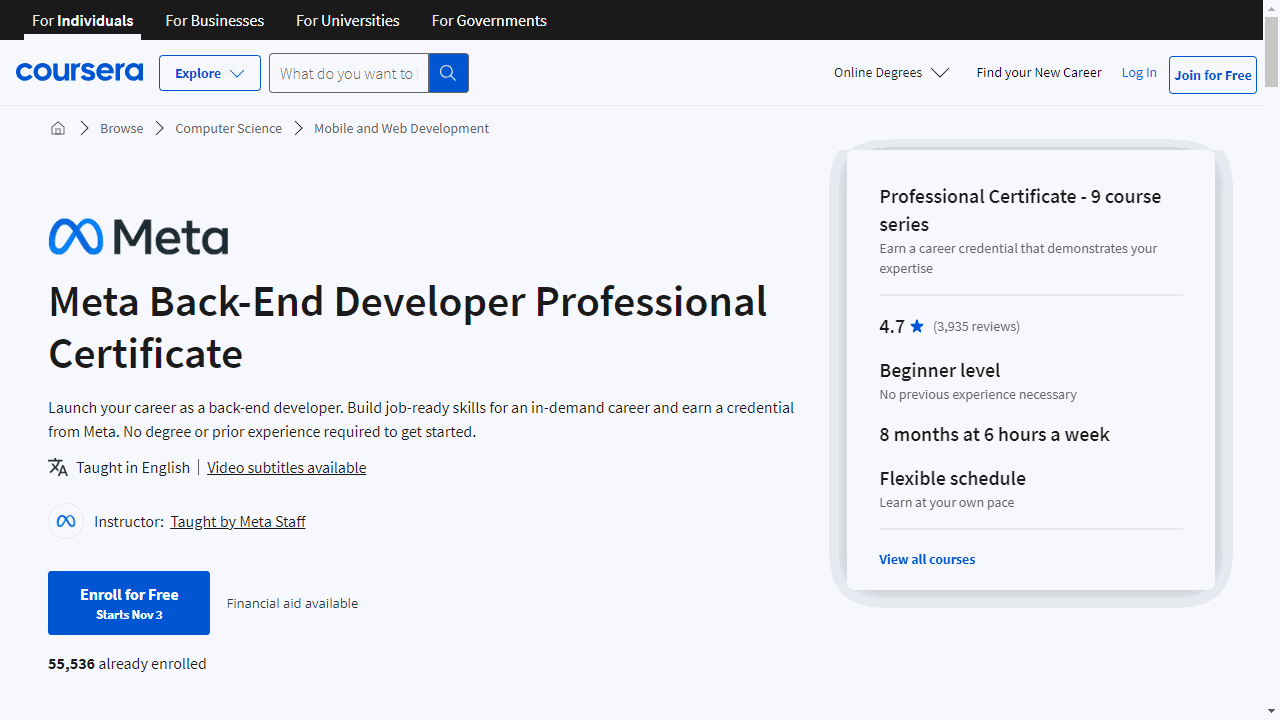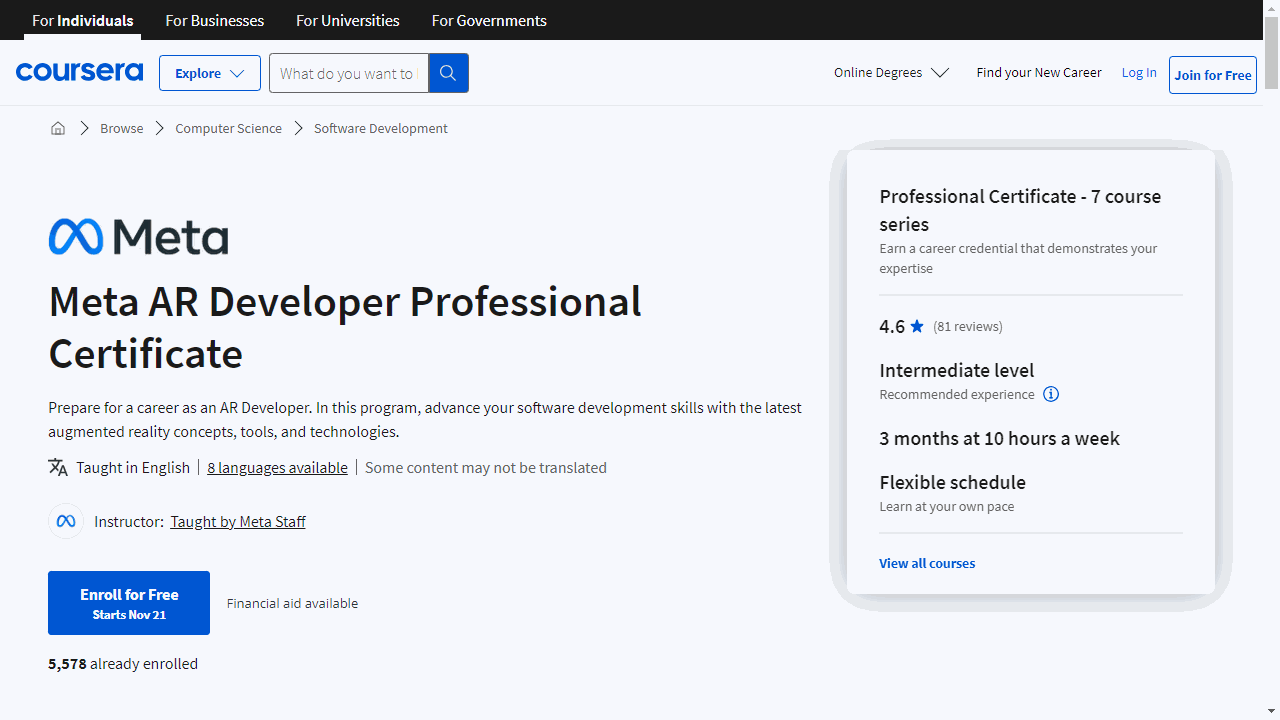Meta, formerly known as Facebook, has a vast and growing presence in the digital world.
Its influence extends beyond social media platforms to encompass cutting-edge technologies like artificial intelligence, augmented reality, and cloud computing.
Learning about Meta’s products and platforms can open doors to exciting career opportunities in fields like marketing, development, and data science.
Finding a high-quality Meta certification on Coursera can feel overwhelming, especially with so many options available.
You might be looking for a course that caters to your specific interests and skills, but also provides the practical experience and industry knowledge you need to stand out in today’s competitive job market.
For the best Meta certification overall on Coursera, we recommend the Meta Social Media Marketing Professional Certificate.
This comprehensive program, designed by Meta itself, is your gateway to becoming a skilled social media marketing practitioner.
It covers everything from the fundamentals of social media marketing to the intricacies of paid advertising on Facebook and Instagram, all while providing hands-on practice through real-world projects.
This is just the beginning of our exploration into Meta certifications on Coursera.
Keep reading to discover other valuable programs, tailored to diverse learning styles and career goals, whether you’re interested in front-end development, mobile app development, or exploring the exciting world of augmented reality.
Meta Social Media Marketing Professional Certificate
This program is designed by Meta to take you from a beginner to a skilled practitioner in the realm of social media marketing.
And who better to learn from than the company that owns the world’s largest social media platforms?
The first step is “Introduction to Social Media Marketing,” where you’ll gain a clear understanding of the marketing landscape.
This course doesn’t just scratch the surface; it delves into selecting the right channels, setting achievable goals, and understanding your audience’s journey.
It’s a solid foundation, and the best part is that it’s accessible to anyone with basic internet skills.
Moving on, “Social Media Management” is where your content creation skills will blossom.
You’ll learn to define your brand’s voice and manage a content calendar that keeps your audience engaged.
This course is particularly valuable for those looking to interact with customers and analyze content performance to refine their strategy.
For those interested in the power of paid advertising, “Fundamentals of Social Media Advertising” offers a deep dive into creating effective social media ads.
You’ll explore the nuances of ad campaigns, from the visuals and copy to understanding privacy policies.
The practical project of crafting a creative brief and launching an ad provides hands-on experience that’s invaluable in the real world.
“Advertising with Meta” elevates your skills further by introducing you to the Meta Ads Manager.
Here, you’ll learn to structure campaigns, target audiences, and manage budgets.
This course is crucial for anyone aiming to leverage Facebook and Instagram ads to reach their marketing objectives.
To ensure your campaigns are hitting the mark, “Measure and Optimize Social Media Marketing Campaigns” teaches you how to interpret campaign data and optimize your efforts.
You’ll get to grips with ROI analysis and A/B testing, skills that are essential for any marketer looking to improve their campaigns continuously.
The capstone of the program is the “Meta Social Media Marketing Capstone,” where everything you’ve learned is put into practice.
Completing this course means not only presenting a comprehensive marketing campaign but also earning the Meta Digital Marketing Associate Certification—a credential that can significantly boost your professional profile.
Overall, this certificate program is a well-rounded educational experience that prepares you for the demands of social media marketing.
It’s designed for eager learners of all levels and provides practical, real-world skills that are immediately applicable.
Meta Front-End Developer Professional Certificate
Begin with “Introduction to Front-End Development,” where you’ll learn the essentials of web development.
You’ll start by crafting simple webpages with HTML and styling them with CSS.
The course introduces you to Bootstrap and React, equipping you with the tools to create user-friendly interfaces.
Progress to “Programming with JavaScript,” where the focus is on the language that brings websites to life.
You’ll gain hands-on experience with JavaScript essentials and learn to test your code effectively using Jest, setting a strong foundation for interactive web development.
“Version Control” is crucial for any developer working in a team.
This course teaches you how to use Git and GitHub for collaboration, ensuring that managing and revising code becomes second nature to you.
In “HTML and CSS in depth,” you’ll refine your design skills, learning advanced styling techniques and responsive design with Bootstrap.
Debugging is also covered, teaching you to identify and fix common front-end issues.
“React Basics” introduces you to the popular JavaScript library for building user interfaces.
You’ll learn to manage data and create dynamic elements, culminating in the development of a React application.
For those looking to deepen their React knowledge, “Advanced React” delves into more complex concepts.
You’ll explore hooks, state management, and component composition, enhancing your ability to build sophisticated applications.
The “Principles of UX/UI Design” course is where design meets functionality.
You’ll learn to empathize with users, design with intention, and prototype your ideas using Figma, ensuring your creations are both attractive and user-centric.
The “Front-End Developer Capstone” project is where you’ll apply everything you’ve learned.
You’ll build an application that demonstrates your skills in React and responsive design, resulting in a portfolio piece to impress potential employers.
Lastly, “Coding Interview Preparation” gets you ready for the job market.
You’ll polish your problem-solving skills, understand data structures and algorithms, and learn strategies for successful technical interviews.
Each course is designed with beginners in mind, requiring no prior development experience—just a willingness to learn and basic internet skills.
Meta React Native Specialization
This specialization is designed to equip you with the skills needed to thrive in the mobile app development space.
The journey begins with “Introduction to Mobile Development,” where you’ll get a clear picture of a mobile developer’s role.
You’ll start with the essentials, HTML and CSS, and quickly move on to the exciting realm of cross-platform apps with React Native.
This course sets a strong foundation, essential for what’s to come.
As you progress to “Programming with JavaScript,” you’ll delve deeper into the language that’s essential for web and mobile app interactivity.
You’ll tackle practical exercises that will solidify your understanding of JavaScript fundamentals, and you’ll learn how to test your code effectively using Jest, ensuring your applications run smoothly.
In “Version Control,” collaboration becomes the focus.
You’ll learn how to use Git and GitHub, tools that are indispensable for working in teams and managing code changes.
This course is crucial for understanding the workflows that keep large-scale projects organized and running efficiently.
“React Basics” is where you start building.
You’ll explore React’s component-based architecture, learning to create interfaces that update dynamically and respond to user input.
This course is about making your apps intuitive and engaging, a skill that’s highly valued in the industry.
With “React Native,” you’ll apply your React knowledge to mobile app development.
You’ll practice building components, managing state, and navigating between screens.
This course is key to understanding how to leverage React’s capabilities to create apps that feel native to both Android and iOS platforms.
“Working with Data” shifts your focus to the backend, teaching you how to handle data within your React Native applications.
You’ll learn about REST APIs, SQL, and data storage solutions like AsyncStorage and SQLite.
This course ensures your apps are not just visually appealing but also robust and data-driven.
The “Principles of UX/UI Design” course is where design meets function.
You’ll learn to create user-centric designs, understanding the importance of empathy in UX research and the practicalities of UI design with tools like Figma.
This course is about ensuring your apps are not only functional but also enjoyable to use.
Finally, the “Capstone (React App)” is where everything you’ve learned comes together.
You’ll take on a real-world project, applying your skills to build an app from the ground up.
This is your opportunity to create a portfolio piece that demonstrates your comprehensive understanding of mobile app development.
If you’re serious about becoming a mobile developer, this specialization is a great place to start.
Meta Android Developer Professional Certificate
The Meta Android Developer Professional Certificate on Coursera is a meticulously crafted program that equips you with the essential skills and practical experience to thrive in the mobile app development industry.
Begin with the “Introduction to Android Mobile Application Development” course, where you’ll familiarize yourself with Android Studio and Kotlin—the core tools for Android app creation.
This course doesn’t just introduce you to the basics; it sets you on a path to building your very first Android app.
As you progress, “Version Control” becomes crucial.
It’s not just about coding; it’s about collaborating effectively.
Learn to navigate Git and GitHub, essential tools for managing changes and working seamlessly with teams across the globe.
Deepen your programming knowledge with “Programming Fundamentals in Kotlin.”
Here, you’ll delve into the language’s nuances, from variables and loops to data structures.
The practical “Bank Account” project solidifies your understanding, bridging theory with real-world application.
No app can succeed without a thoughtful user experience.
“Principles of UX/UI Design” immerses you in the user’s world, teaching you to conduct research and translate findings into intuitive designs.
You’ll practice with Figma, moving from abstract concepts to tangible wireframes and prototypes.
Transitioning these designs into functional interfaces is where “Create the User Interface in Android Studio” comes in.
You’ll explore Jetpack Compose and learn to craft user interfaces that are not only visually appealing but also adhere to best practices in usability.
For those ready to tackle more complex challenges, “Advanced Programming in Kotlin” introduces sophisticated programming concepts.
This course is about refining your skills, focusing on advanced object-oriented features and unit testing to ensure your apps are reliable and maintainable.
Data persistence and web communication are pivotal in modern apps, and “Working with Data in Android” covers these topics comprehensively.
You’ll get hands-on with SQLite and Kotlin coroutines, learning to manage data effectively and ensure your app’s longevity.
The program also recognizes the importance of cross-platform development.
“Mobile Development and JavaScript” lays the groundwork for using JavaScript and prepares you for React, a key library for building cross-platform applications.
Building on that, “React Basics” and “React Native” guide you through creating dynamic user interfaces and mobile apps with React.
These courses are practical, focusing on components, props, and state management within the React ecosystem.
The culmination of your learning is the “Android App Capstone,” where you apply everything you’ve learned to develop a comprehensive Android app.
This project is not just an academic exercise; it’s a portfolio piece that demonstrates your capabilities to future employers.
Lastly, “Coding Interview Preparation” ensures you’re not just a skilled developer but also a savvy interviewee.
You’ll learn effective communication, problem-solving techniques, and the computer science fundamentals that interviewers look for.
This program is designed to be comprehensive without being overwhelming.
It’s structured to provide a logical progression of skills, building on each previous course to solidify your understanding and prepare you for the next step.
Meta iOS Developer Professional Certificate
Embarking on a career in iOS development requires a solid foundation and a diverse skill set, which is precisely what the “Meta iOS Developer Professional Certificate” on Coursera offers.
This comprehensive program is designed to equip you with the essential tools and knowledge needed to excel in the field.
The journey begins with “Introduction to iOS Mobile Application Development,” where you’ll familiarize yourself with the iOS platform and Swift programming language.
This course sets the stage by introducing you to XCode and Swift playgrounds, enabling you to write your first lines of code and understand the iOS app ecosystem.
As you progress to “Version Control,” the focus shifts to collaboration and efficiency.
You’ll learn to navigate Git and GitHub, essential tools for managing code in a team setting.
The course also covers Linux commands, which are invaluable for streamlining your development process.
For those new to programming, “Programming Fundamentals in Swift” breaks down the basics.
It’s a deep dive into the core concepts of Swift, from variables and data types to functions and closures, ensuring you have a strong grasp of the language’s fundamentals.
Design is just as critical as development, and “Principles of UX/UI Design” addresses this by teaching you to create user-centric designs.
Through research and tools like Figma, you’ll learn to craft interfaces that are both visually appealing and functional.
With “Create the User Interface with SwiftUI,” you’ll apply your design knowledge to build intuitive user interfaces.
This course covers a range of UI components and teaches you how to implement them using SwiftUI, enhancing the user experience of your apps.
“Advanced Programming in Swift” is tailored for those ready to tackle more complex programming challenges.
It covers advanced topics such as custom data types, error handling, and unit testing, preparing you to write sophisticated and reliable code.
Data is at the heart of modern apps, and “Working with Data in iOS” ensures you’re adept at handling it.
You’ll explore APIs, asynchronous programming, and Core Data, skills necessary for creating dynamic and responsive apps.
The program also includes “Mobile Development and JavaScript,” which introduces you to JavaScript and sets the stage for cross-platform development.
This course is a stepping stone to using React for building versatile mobile applications.
“React Basics” and “React Native” further expand your development repertoire, focusing on building scalable and maintainable web and mobile applications with React.
You’ll learn about components, state management, and navigation, among other key React concepts.
The “iOS App Capstone” is where you’ll synthesize all you’ve learned by developing a native iOS app.
This project-based course allows you to apply your skills in a practical setting, culminating in a portfolio-worthy piece that demonstrates your capabilities to employers.
Lastly, “Coding Interview Preparation” readies you for the job market.
It covers problem-solving strategies, computer science fundamentals, and interview techniques, giving you the confidence to ace technical interviews.
This program is meticulously crafted to provide a well-rounded education in iOS development.
It’s not just about learning to code; it’s about understanding the entire app development lifecycle, from concept to design, development, and deployment.
Meta Database Engineer Professional Certificate
The journey begins with “Introduction to Databases,” where you’ll gain a foundational understanding of database principles and get to grips with SQL.
This course sets the stage for what’s to come, ensuring you have a strong base to build upon.
Moving on to “Version Control,” you’ll learn the essentials of collaborative software development.
This course teaches you how to use Git and Linux commands, tools that are crucial for managing complex projects and workflows.
As you progress to “Database Structures and Management with MySQL,” your SQL skills will deepen.
You’ll learn to manipulate databases with more sophisticated queries and understand the importance of database relationships and normalization.
“Advanced MySQL Topics” is where your database skills become more nuanced.
You’ll tackle complex SQL statements, learn to optimize queries, and understand advanced features like triggers and events.
This course is about refining your skills and preparing you for more complex database tasks.
With “Programming in Python,” you’ll step into the world of programming, learning Python from the ground up.
This course is essential for back-end development and database engineering, as Python is a key language in these domains.
In “Database Clients,” you’ll bridge the gap between Python programming and database management, learning to create applications that interact with MySQL databases.
This skill is invaluable for developing custom database solutions.
“Advanced Data Modeling” takes you into the realm of data warehousing and ETL processes.
Here, you’ll learn about the storage, optimization, and administration of large-scale databases, preparing you for challenges in managing big data.
The “Database Engineer Capstone” project is where you’ll apply everything you’ve learned.
You’ll build a database solution from the ground up, demonstrating your ability to tackle real-world problems.
Lastly, “Coding Interview Preparation” will help you navigate the job market.
This course provides insights into the interview process, teaching you how to approach coding problems and communicate effectively.
Throughout the certificate program, you’ll develop a diverse set of skills, including database design, MySQL, Python programming, and more.
The courses are structured to build on each other, ensuring a smooth learning curve.
This professional certificate is accessible to anyone eager to learn, regardless of previous education or experience.
Meta Marketing Analytics Professional Certificate
The first course is “Marketing Analytics Foundation,” where you’ll grasp the essentials of marketing principles and the pivotal role of data.
It’s not just about collecting numbers; it’s about understanding what they tell you and how they can guide your marketing decisions.
You’ll get practical experience with tools like the Meta pixel and Google Analytics, all while navigating the complexities of online privacy laws.
As you progress to “Introduction to Data Analytics,” you’ll start to see how setting clear goals and identifying the right metrics can shape your marketing strategy.
The OSEMN framework introduced here will become your systematic guide to making sense of data, helping you to extract valuable insights.
In “Data Analysis with Spreadsheets and SQL,” the focus shifts to the technical skills needed to organize and analyze data.
You’ll learn to clean up data sets, uncover trends, and communicate your findings through compelling visualizations.
The course demystifies SQL queries, empowering you to handle larger datasets with ease.
For those intrigued by programming, “Python Data Analytics” offers an introduction to using Python for data manipulation.
This course is ideal for anyone looking to expand their toolkit beyond spreadsheets, providing a foundation in a language that’s become a staple in the data analysis field.
“Statistics for Marketing” dives deeper into the data, teaching you to understand and apply statistical concepts.
From hypothesis testing to regression analysis, this course gives you the knowledge to interpret data correctly and make predictions that can inform your marketing strategies.
Building on these statistical foundations, “Data Analytics Methods for Marketing” explores specific techniques like segmentation and marketing mix modeling.
This course is about applying your analytical skills to real-world marketing challenges, helping you to forecast and optimize your efforts effectively.
With “Marketing Analytics with Meta,” you’ll gain hands-on experience with Meta’s suite of marketing tools.
Creating ads, running A/B tests, and analyzing campaign performance are just a few of the skills you’ll develop.
This course is tailored for those who want to leverage Meta’s platforms to enhance their advertising strategies.
The program culminates with the “Meta Marketing Science Certification Exam” course, preparing you for a certification that showcases your expertise.
It’s a rigorous test of everything you’ve learned, providing a credential that’s recognized in the industry.
Each course is designed to be accessible, requiring no prior experience in marketing or data analysis—just a willingness to learn.
By the end of the program, you’ll have a robust set of skills that can elevate your marketing career.
Meta Spark Creator AR Certification Prep Specialization
Exploring the realm of augmented reality (AR) can be a transformative step in your career, and the “Meta Spark Creator AR Certification Prep Specialization” on Coursera is a comprehensive pathway to mastering this innovative technology.
The journey begins with “Foundations of AR,” a course that lays the groundwork for understanding AR’s place within the broader context of extended reality (XR).
You’ll delve into the practical applications of AR, learning how it’s transforming industries from marketing to education.
The course also demystifies the technologies behind AR, including computer vision, and walks you through the software development lifecycle.
A background in programming and web development will help you absorb the material more effectively.
Moving forward, “AR in marketing using Meta Spark” equips you with the skills to craft engaging AR experiences specifically for marketing.
You’ll become proficient with Meta Spark tools, learning to create, optimize, and deploy AR effects that can captivate an audience.
This course is particularly valuable for those looking to leverage AR in digital marketing strategies.
The capstone of the specialization is the “Meta Spark Creator AR Certification” course.
It’s designed to prepare you for the Meta Certified Spark Creator exam, ensuring you have the knowledge and resources to succeed.
Access to this course is exclusive to those who have diligently worked through the preceding modules, ensuring a solid foundation of skills.
Throughout the specialization, you’ll gain a robust set of competencies, from understanding the XR spectrum to applying AR in various sectors.
It’s an investment in a skill set that’s increasingly relevant in our tech-driven world, opening doors to creative and cutting-edge career opportunities.
Meta Back-End Developer Professional Certificate
You’ll start by learning the basics of HTML, CSS, and JavaScript to build web pages and interfaces.
Then you’ll dive into Python, databases, version control with Git, and the Django web framework—the key technologies backend developers work with daily.
The project-based courses give you hands-on practice building real web apps and APIs from scratch. You’ll create your own restaurant reservation site, allowing you to showcase your work in a portfolio.
The curriculum was developed by Meta experts to align with industry needs, ensuring you learn the most in-demand programming languages and frameworks.
A major benefit is the flexible self-paced format. You can work through the material on your schedule, repeating sections as needed to fully master the concepts.
This certificate also preps you for technical interviews, giving you a competitive edge in the job market for web developers.
Meta AR Developer Professional Certificate
The certificate kicks off with “Foundations of AR,” a course that lays the groundwork for understanding AR’s place within the broader context of extended reality (XR).
It’s not just about the cool factor of AR; you’ll delve into the practical applications and technologies that drive AR experiences, preparing you for a future where digital and physical realities converge.
Moving on, “AR in marketing using Meta Spark” equips you with the skills to craft compelling AR effects for social media campaigns.
This course isn’t just about learning a tool; it’s about understanding the principles of AR design and development that will serve you across various platforms and tools.
For web enthusiasts, “AR for web using JavaScript” offers a deep dive into creating browser-based AR experiences.
You’ll harness the power of PlayCanvas and JavaScript to build educational content that’s interactive and immersive, making learning an engaging adventure.
“Unity and C# basics” is where gaming and AR intersect.
Unity is a cornerstone of AR development, and this course will have you navigating its interface, managing assets, and scripting in C# to bring your game ideas to life.
You’ll learn to create games that offer a new dimension of interaction through AR.
Building on your Unity skills, “Using AR Foundation in Unity” introduces you to AR Foundation, a tool that enhances your ability to develop sophisticated AR games.
You’ll tackle concepts like marker detection and game dynamics, ensuring your creations are not just fun but also technologically robust.
“AR games using Vuforia SDK” expands your toolkit with the Vuforia SDK, another Unity-compatible tool that specializes in plane tracking.
Here, you’ll apply your skills to develop an AR bowling game, learning how to create games that interact with the user’s environment in real-time.
The capstone of the certificate, “Meta Spark Creator AR Certification,” is your stepping stone to official recognition as a Meta Certified Meta Spark Creator.
This course is designed to consolidate your learning and prepare you for the certification exam, a credential that can significantly bolster your professional profile.
Each course in the certificate builds upon the last, ensuring a structured learning path that gradually enhances your AR development skills.
While some experience with object-oriented programming and web development is recommended, the courses are designed to be accessible and build upon your existing knowledge.
This certification is a thoughtful compilation of courses that provide not just technical skills but also an understanding of how AR can be applied across various industries.
